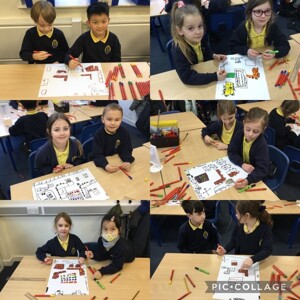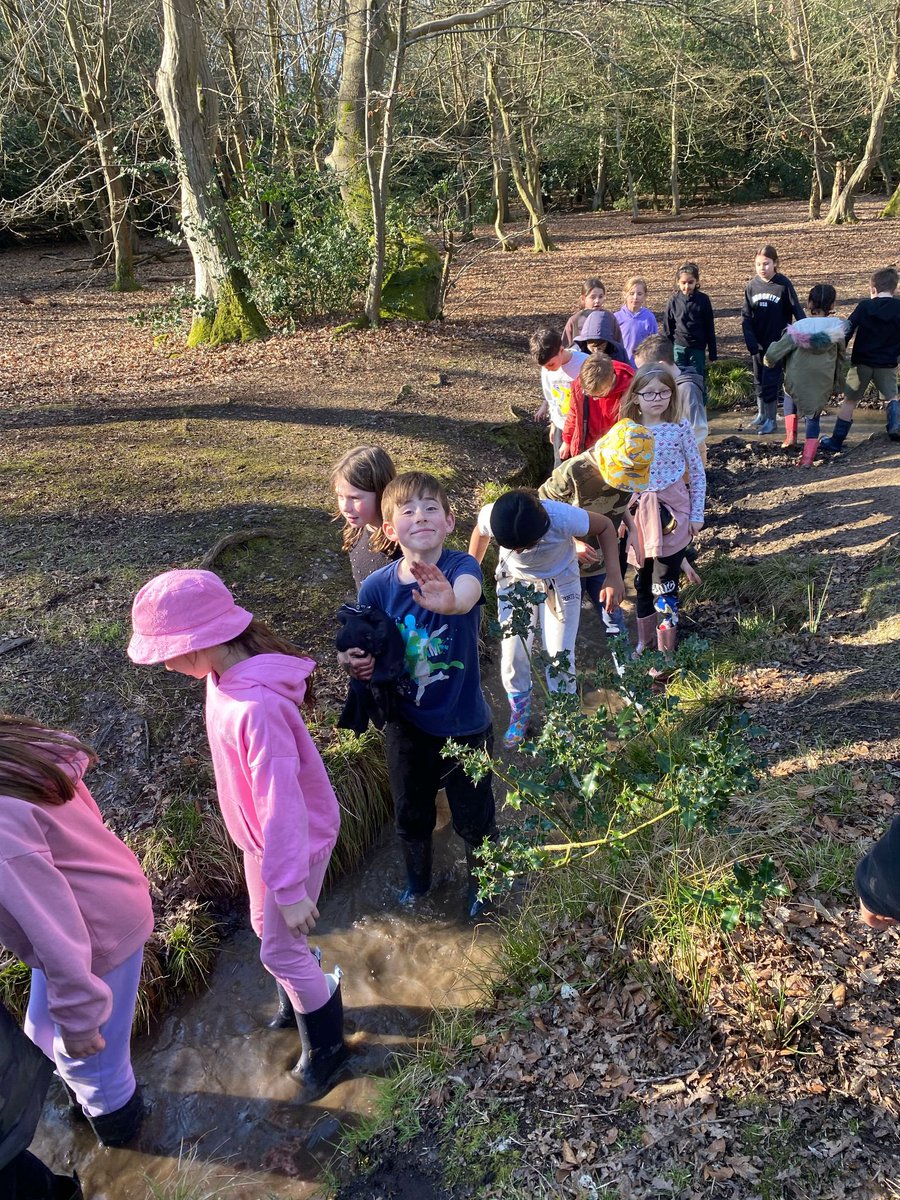Geography
"The study of geography is about more than just memorising places on a map. It’s about understanding the complexity of our world, appreciating the diversity of cultures that exists across continents. And in the end, it’s about using all that knowledge to help bridge divides and bring people together." Barack Obama
Geography at Samuel Ryder Academy empowers students with the knowledge to appreciate our rapidly changing environment both near and far from home. A combination of traditional maps, fieldwork and digital tools are always at the heart of our geographical investigations.
Our geography students become global citizens of the 21st century and are able to visualise geography in all current affairs. Furthermore, they develop outstanding interpersonal skills, analytical skills, literacy and oracy skills that increase their employability for the future.
KS1
Geography is a very important subject for children to understand the world around them. They enjoy locating new places and learning about their features. Children also begin to learn skills of working with maps and compasses, as well as develop essential problem-solving and enquiry skills both inside and outside the classroom. In Key Stage 1, children use iPads and applications like Google Maps to explore the world digitally, increasing their social and cultural awareness of the area around the school and to the capital cities of the United Kingdom. In Key Stage 1, children learn a geography topic in each year as well as linking geography to other topics. For example, when learning about the Great Fire of London in History, our children use the Virtual Reality headsets to walk down an immersive Stuart-period street in central London.
Children are encouraged to develop higher order thinking when comparing different locations around the world.
Children have numeracy opportunities to develop their oracy skills through group work and whole class discussion. They start to learn how to Talk Like a Geographer.
|
|
Main geography topic |
Geography links to these topics |
|
Year 1 |
Our school and the local area |
Carnival of the Animals |
|
Year 2 |
We are Britain |
Famous for more than 5 minutes |
KS2
Geography is a subject which shows children how to make sense of our world, whilst providing the tools and understanding to improve the world for the future. Children gain an appreciation of life in different cultures in the present day as well as undertaking a journey into cultures in the past. In Key Stage 2, children learn a geography topic in each year as well as linking geography to other topics. By comparing and contrasting different locations around the world, children develop their higher order thinking skills in a structured environment. Through the effective use of iPads and applications such as Google Maps to explore the world digitally, children increase their social and cultural awareness of the world including the Amazon rainforest and the Grand Canyon. The Virtual Reality headsets support and embed learning, giving the children a real sense of awe and wonder as they stand in the rainforest or watch a volcano erupt.
Children have numeracy opportunities to develop their oracy skills through group work and whole class discussion. They start to learn how to Talk Like a Geographer.
|
|
Main geography topic |
Geography links to these topics |
|
Year 3 |
Rainforests |
Roman Britain |
|
Year 4 |
Mountains, Rivers and Coasts & European environment issues and sustainability |
Anglo-Saxons & Vikings and Ancient Egypt |
|
Year 5 |
Grand Canyon vs local study |
The Mayans & Ancient Greece |
|
Year 6 |
Earthquakes and volcanoes |
China & the Shang Dynasty and WW2 |
KS3
Our curriculum introduces a wide range of key concepts, skills and processes that broaden knowledge and understanding of the world. Geography as Samuel Ryder Academy allows students to be curious about the world around them, and to build their social awareness as they consider how the physical and human geography changes the life experience of people around the world. They build their understanding of different cultures and values around the world and how these are different from their own life experiences; for example, we compare the different impacts of climate change in the United Kingdom and Maldives, we consider the lifestyle implications of living in the Namibian desert and contrast standards of living in the city of Mumbai and a UK city.
Students develop understanding and skills in the following areas:
- Knowledge and understanding of a range of geographical topics, as they develop the ability to interpret a variety of different types of information from written reports to maps to data, and make connections between geographical concepts and the processes that change our human and physical world.
- Oracy through class discussions and presentation work, for example researching and recording a topical video news report.
- Place knowledge, as they develop knowledge about a range of places on a variety of scales from local to global, from their own community to a variety of countries around the world.
- Geographical skills when undertaking geographical enquiries through the use of maps, data and images and through the application of evaluation and assessment.
- Fieldwork techniques through a variety of in class and outside geographical fieldwork experiences.
- Literacy skills are developed through a variety of geographical related reading materials, along with building extended writing skills using excellent spelling & grammar with the consistent use of geographical language.
- Digital technology through the use of iPads to explore Geographical Information Systems (GIS), to create spreadsheets and produce graphs and charts, to explore online information sites and to conduct fieldwork.
Students are formatively assessed throughout each year, with one formal assessment completed in each topic.
|
|
Autumn 1 |
Autumn 2 |
Spring 1 |
Spring 2 |
Summer 1 |
Summer 2 |
|
Year 7 |
My place in the world |
Geography skills & fieldwork |
Climate Change |
Risky Rivers |
Population |
Geographical Enquiry |
|
Year 8 |
Natural Hazards |
Natural Resources |
Superpowers |
Hot and Cold Environments |
Geographical Enquiry |
|
|
Year 9 |
Global Issues |
Changing coastlines |
Development |
Cities and challenges |
Geographical Enquiry |
|
KS4
GCSE is a very popular choice, across both year 10 and year 11. Students develop skills and knowledge that supports the study of all other subjects. Students are taught by an experienced subject-specialist in mixed ability groups.
Our geography curriculum at Key Stage 4 builds on the many skills that students have developed through Key Stage 3 geography. We study a range of both human and physical topics; many of which are relevant within the students’ day-to-day lives: whether this is the causes and social, economic, environmental and political impacts of climate change; or how the increasing cost of fuel is an example of challenges with our global natural resources. Students continue to develop their analytical skills and use maps and graphs to advance their geographical understanding. By continuing to build their geographical literacy as we explore texts, web sites and other sources of information, students broaden their understanding and they develop their evaluative writing skills. Students use iPads in most lessons to access resources and to explore information for themselves. When comparing a tropical rainforest to a savannah or a desert, the Virtual Reality headsets fully immerse students in the landscape.
There are a variety of ways that SCHOLAR is embedded into geography lessons, these include developing leadership skills and curiosity in the world. Oracy skills are encouraged through class discussion and presentation opportunities. Students develop examination skills through lessons, but also in end-of-topic formal assessments including the end of year 10 assessments and year 11 mock exams.
There are two compulsory days for fieldwork investigations consisting of one physical fieldwork day and one human fieldwork day. These educational visits are a great way of bringing the learning in the classroom to life, and also form a significant part of the students’ final examinations. When choosing GCSE options, it is important to consider that attendance and engagement over both days of the fieldwork is an essential part of the GCSE course.
Exam Board: AQA 100% examination based
https://www.aqa.org.uk/subjects/geography/gcse/geography-8035
This, very popular AQA GCSE specification, covers the two years of GCSE course. Students learn a variety of physical and human geography-based topics that are assessed through two examinations at the end of year 11. The third examination comprises a pre-release booklet that is given to students shortly before the paper 3 examination. This booklet has covered topics ranging from water availability in the UK, to deforestation in Peru. As a result, we are able to undertake comprehensive preparation in class in order to prepare students for this exam. Additionally, in the third examination, some of the questions refer to the knowledge and experience gained during the two days of fieldwork.
Students are expected to have a well-stocked pencil case, including highlighters, colouring pencils and a scientific calculator.
|
Paper |
Topics |
Time and Percentage |
|
Paper 1 Living with the physical environment |
The challenges of natural hazards The living world Physical landscapes in the UK (Options = Coastal and River landscapes) |
1 hour 30 minutes 35% of GCSE |
|
Paper 2 Challenges in the Human Environment |
Urban Issues and Challenges The changing economic world The challenge of resource management (option = water) |
1 hour and 30 minutes 35% of GCSE |
|
Paper 3 Geographical Investigations |
Issue Evaluation Fieldwork Geographical skills |
1 hour and 30 minutes 30% of GCSE |
|
|
Autumn |
Spring |
Summer |
|
Year 10 |
The challenge of natural hazards
|
Urban Issues and Challenges
Physical Landscapes in the UK
Epping Forest – River characteristics fieldtrip
|
The Challenge of Resource Management |
|
Year 11 |
The Living World |
The Changing Economic World
London Urban Regeneration Fieldtrip
|
Geographical Applications (pre- release) |
Beyond GCSE
Awarding body: AQA, A-Level Geography
Specification number: 7037
Geography A-level provides a detailed understanding of geographical processes, the importance of place for human society and the global impacts on place and the human environment. Students build practical geographical skills and critically engage with real world issues on a variety of scales. Students grow as independent thinkers, and as informed and engaged global citizens, with an understanding of the role and importance of geography as one of the key disciplines relevant to understanding the world’s changing places, people and environments.
The two-year course covers physical and human geography. The physical geography is delivered through a systems approach to examine concepts and processes, developing knowledge of places and environments. In human geography, students learn how the world has become increasingly connected through globalisation and the implications of this approach, develop a sense of place and the importance of resource security, amongst other things.
The final aspect is a piece of Non-Examination Assessment which is similar to a piece of coursework. Students independently investigate an issue of their choice, undertake fieldwork and research, then evaluate the idea drawing on wider knowledge and understanding from across the course.
Fieldwork is compulsory and vital for the A-Level geography course. Students participate in four days of fieldwork, as well as working independently to plan and collect data for their own coursework investigation. Fieldwork opportunities include day trips to explore regeneration and the changing sense of place of an urban landscape and a residential trip exploring the changing coastal landscape of Dorset.
The course is assessed through 2 examinations and 1 piece of coursework which is called the Non-Examination Assessment.
|
Paper |
Topics |
Time and Percentage |
|
Paper 1 Physical Geography |
Section A: Water and Carbon Cycle Section B: Coastal Systems and Landscapes Section C: Hazards |
2h 30mins 40% of the qualification 120 marks |
|
Paper 2 Human Geography |
Section A: Global Systems and Global Governance Section B: Changing Places Section C: Population and the Environment |
2h 30mins 40% of the qualification 120 marks |
|
Non-Examination Assessment |
Independent investigation of a topic of the student’s choice. Issue Evaluation Fieldwork and research Evaluation & Analysis |
Non-Examination Assessment 20% of the qualification 60 marks |
Geography is a highly valued subject. Here are just some of the reasons why students should study A-Level geography at Samuel Ryder Academy.
- Class sizes facilitate effective discussion in year 12 and year 13.
- A team of highly experienced specialist teachers with numerous years teaching this specification.
- A strong track-record of excellent results that are consistently better than the national average.
- Students frequently continue their geographical study at university and utilise their specialist knowledge in their careers.
- The subject promotes the development of problem solving and critical thinking skills, alongside effective data analysis. These are all crucial skills in the current jobs market. A geography A-Level requires our young people to be articulate and enhances their oracy skills.
- A-Level geography links to all other A-level and BTec subjects available at Samuel Ryder Academy, whether it be knowledge and understanding or ability to use data on computer programmes or analysing resources effectively.
- Fieldwork opportunities are numerous in geography A-level.
As geography is a linear course, studied over two years, successful students show rigour with their note-taking and home-study, which allows them to achieve excellent outcomes at the end of year 13. Students demonstrate their independent learning abilities and undertaking wider reading around the topics and subject in their own time.
Students are expected to have a well-stocked pencil case, including highlighters, colouring pencils and a calculator.
Wider Curriculum Opportunities and Careers
Wider Curriculum Opportunities and Careers
There are endless wider curriculum opportunities in geography. Some of these include:
- Fieldwork: at GCSE students are expected to participate in 2 days of compulsory fieldwork: 1 human geography day and 1 physical geography day. At A-Level, students participate in 4 days of compulsory fieldwork which develops their skills and understanding to undertake a non-examination assessment. At KS3, students are introduced to fieldwork skills and have the opportunities to develop understanding of geography outside of the classroom both ‘live’ and ‘virtually’ using tools available on their iPads and through the virtual reality headsets.
- A number of competitions such as the ‘Young Geographer of the Year’ run by the Royal Geographical Society.
- Speakers and visits: a wide variety of speakers visit Samuel Ryder Academy to share their knowledge and experiences. For example, we hosted an Urban Planning workshop, showcasing careers that geography can lead to.
- Our Geography Board Games Club is a popular lunchtime event, where students hone their geographical knowledge with a variety of great games to suit every taste.
- Within each topic, students are encouraged to extend their own knowledge and skills. Reading-based homework tasks encourage students to read more widely about the subject.
- ‘Geography in the News’: we always want to keep up to date with events in the news, so every few weeks the classes will cover current affairs. In the meantime, take a look at the BBC website and National Geographic website.
- We join together as the humanities faculty in the annual Eggheads quiz as part of our house competition.
Career Paths
Geography students and graduates are the most employable post study. All avenues of employment are open for geography students. Many find work in business, finance and human resources and many journeys into marketing, public relations and sales or into roles working in sustainability or the environment. More geographers are now venturing into education, sustainability management, environmental sciences, engineering and construction. Other sectors include town planners, architects, journalism and working with charities, to name a few. Geographers are valued due to their proven ability to problem solve and think critically.
Useful links
GCSE AQA specification:
https://www.aqa.org.uk/subjects/geography/gcse/geography-8035
A-level AQA specification:
https://www.aqa.org.uk/subjects/geography/as-and-a-level/geography-7037
Geography Review: Quarterly magazine targeted at A-level geography students
A level magazines- Geography review
WideWorld: Quarterly magazine targeted at GCSE students
SCHOLAR in Geography
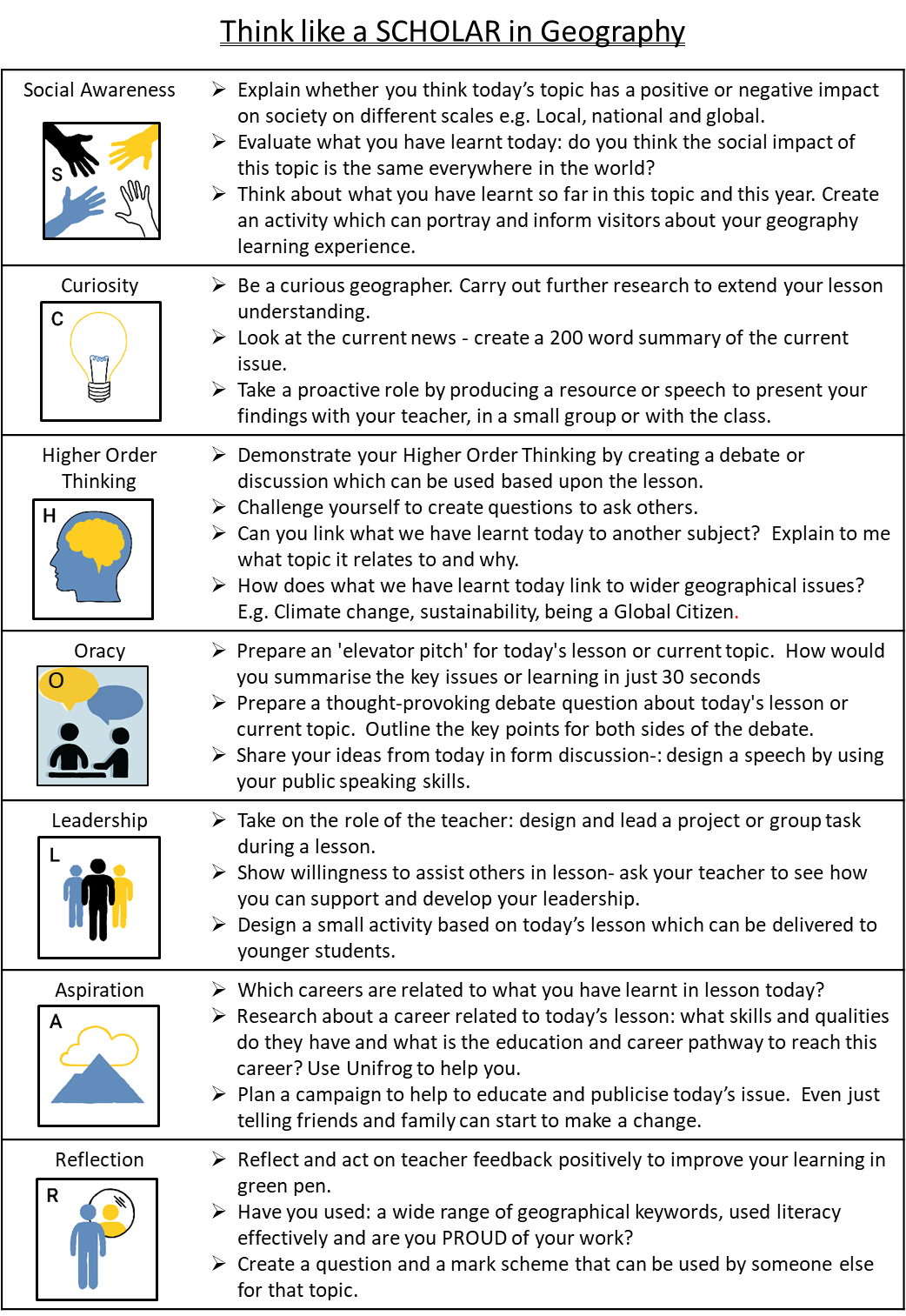
Kiera P, Highly Commended Young Geographer of the Year 2021
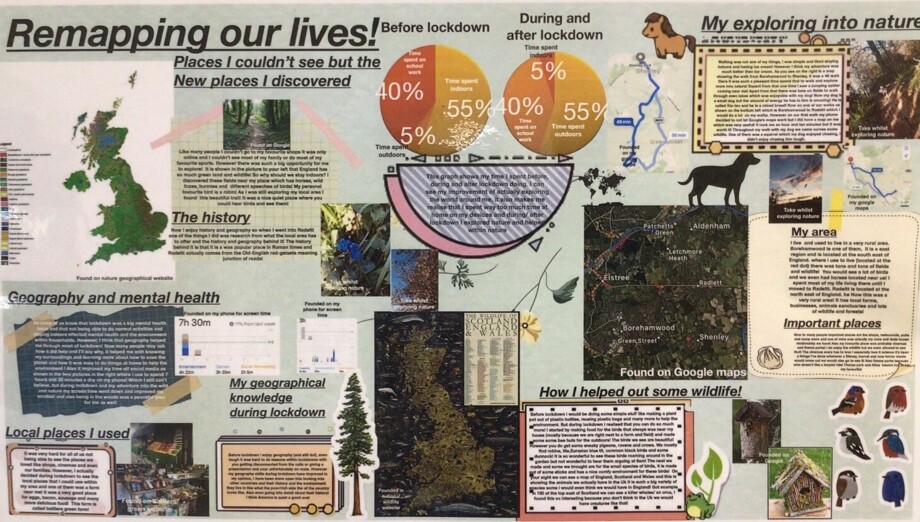
Eloise R: 2023 Young Geographer of the Year entry
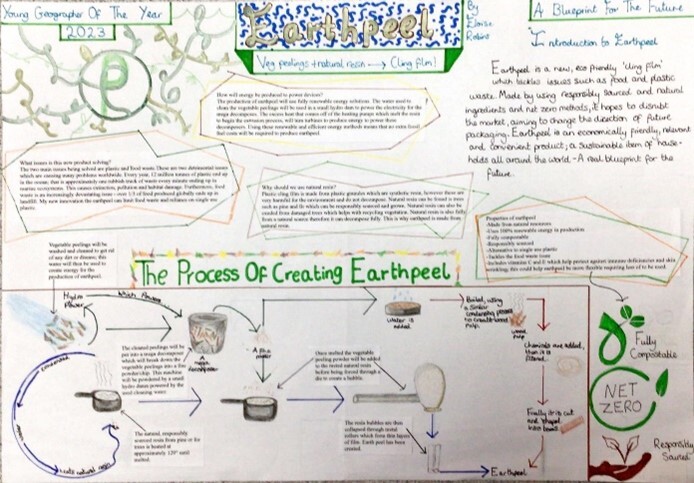
GCSE Fieldwork
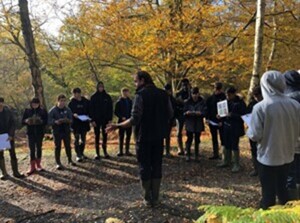
A-level fieldwork
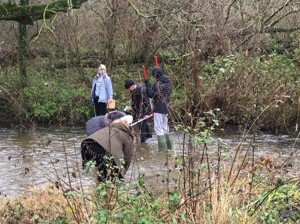
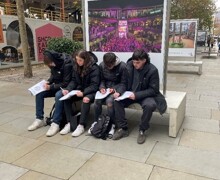
Year 7 Geographers investigating the best location for a new bench
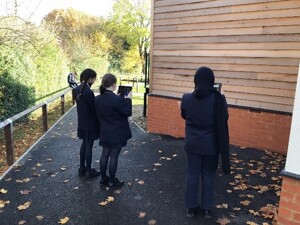
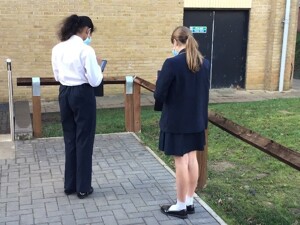
Year 10 and Year 12 Urban Planning workshop
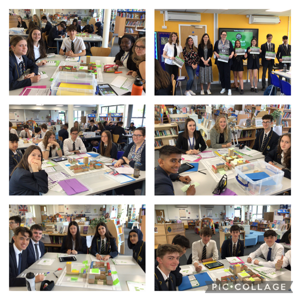
Year 2 Mapping the playground
